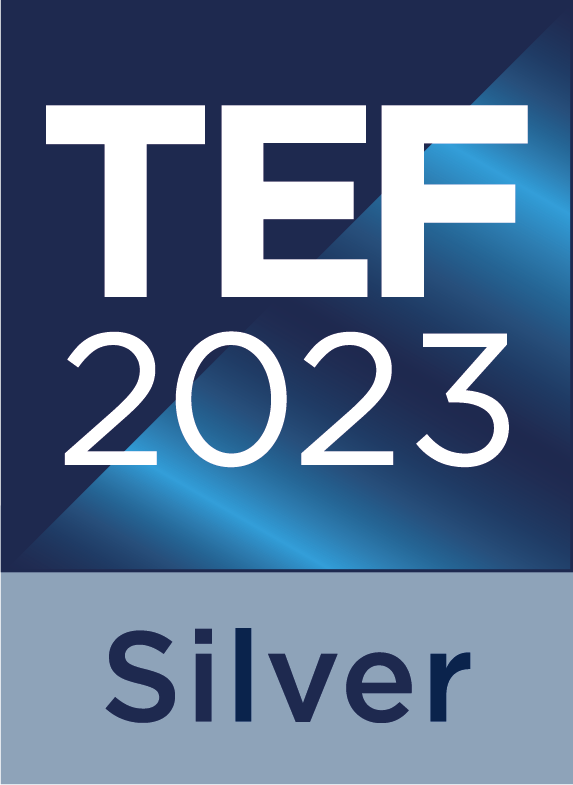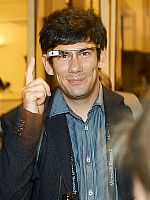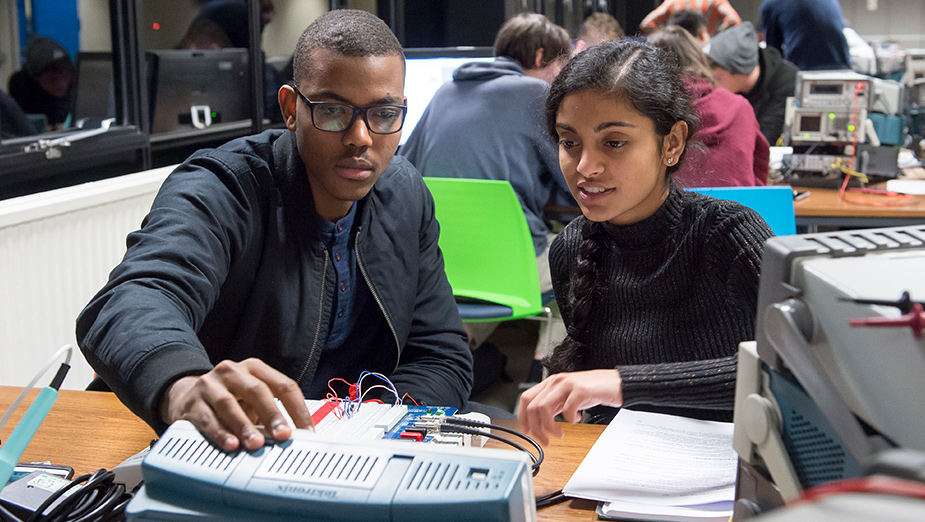Key information
- Duration:
- 5 years full time
- Typical A-level offer:
- AAB
View full entry requirements - UCAS code:
- H61F
- Start date:
- September 2025
- 87.9% of our research outputs in Engineering were assessed to be world leading or internationally excellent (REF 2021)
Our Master of Engineering (MEng) degree lets you specialise your degree with a range of options and provides you with the educational requirements needed to become a Chartered Engineer.
From renewable energies, autonomous cars, robotics and mobile communication to advances in medicine, electrical and electronic engineering underpins all facets of our daily lives. Our research in sensors, flexible electronics, medical robotics and imaging, 5G communications and space systems informs our teaching.
You’ll study in our Future Technologies Labs, which provide a new space for building robots, programming embedded systems and digital signal processors, as well as computer design and modelling suites. You’ll use our electronics and control engineering laboratories, and electrical drive systems, and could be part of one of the Formula Student or Medical Robotic teams.
As you progress, you’ll focus on electrical or electronic engineering. You’ll get specialist training in applications ranging from sensor design to hardware accelerators, and from semiconductor devices to electric motors for future green transport. We have dedicated academic advisers to support you during you time at Sussex, as well as a team of student mentors.
You’ll gain hands-on experience with industry-standard equipment. In your final year, you’ll work on a project inspired by industrial needs. The optional year in industry is a valuable opportunity to experience work as an engineer within a commercial company. You’ll be able to contribute to design products and services that will shape the society of the future. All this gives you the confidence, skills and experience for the next step in your career.
To help you gain experience and increase your employability, you can apply for an optional placement as part of your course. This can be a fantastic opportunity to gain real-life insight into industry as well as skills valued by employers. You’ll be responsible for applying for and securing your placement. Our dedicated careers team can help you:
- find an employer
- draft an application
- prepare for interviews.
Don’t worry if you’re not successful, you’ll simply transfer to a non-placement version of your course.
We understand that deciding where and what to study is a very important decision. We’ll make all reasonable efforts to provide you with the courses, services and facilities described in this prospectus. However, if we need to make material changes, for example due to government or regulatory requirements, or unanticipated staff changes, we’ll let you know as soon as possible.
MEng or BEng?
We also offer this course as a four-year MEng without the industrial placement year, as a three-year BEng, or as a four-year BEng with an industrial placement year. Find out about the benefits of an integrated Masters year.
Open Days and virtual visits
Meet us on campus or online
Entry requirements
A-level
| Typical offer | AAB |
|---|---|
| Contextual offer | View contextual offer Not everyone has the same support to get to higher education – we help you reach your potential. When we receive applications through UCAS, we consider all factors and will sometimes make contextual offers as part of our Access and Participation Plan |
| Subjects | A-levels must include Mathematics. |
| GCSEs | You should have a broad range of GCSEs grade 9-4 (A*-C), including good grades in relevant subjects. |
| Extended Project Qualification | We take the EPQ into account when considering your application and it can be useful in the summer when your results are released if you have narrowly missed the conditions of your offer. We do not routinely include the EPQ in the conditions of your offer but we sometimes offer alternative conditions that include the EPQ. If you wish to discuss this further please contact us |
Other UK qualifications
Access to HE Diploma
| Typical offer | Pass Diploma with at least 39 level 3 credits at Merit or above including 27 credits at Distinction |
|---|---|
| Subjects | You will normally need A-level Mathematics, grade B, in addition to the Access to HE Diploma. |
| Additional requirements | All Access applicants will be assessed on a case by case basis. |
Cambridge Pre-U Principal Subjects (including A-level mixes)
| Typical offer | D3, D3 and M2 in the Pre-U If you have one A-level and two Cambridge Pre-U Principle Subjects, we would expect you to have a grade A in the A-level and D3 and M2 in the two Pre-Us. If you have two A-levels and Cambridge Pre-U Principle Subjects, we would normally expect you to have grades AB in the two A-levels and D3 in the Pre-U. |
|---|---|
| Subjects | You must have either Mathematics at A-level or Cambridge Pre-U Principal subject. |
| GCSEs | You should have a broad range of GCSEs grades 9-4 (A*-C), including good grades in relevant subjects. |
International Baccalaureate
| Typical offer | 34 points overall from the full IB Diploma. |
|---|---|
| Subjects | Higher Levels must include Mathematics, with a grade of 5. For entry in 2021, either Mathematics: Analysis and Approaches or Mathematics: Applications and Interpretation at Higher Level will be accepted. |
Pearson BTEC Level 3 National Diploma and one A-level
| Typical offer | Grade A in A-level and DD in Pearson BTEC Level 3 National Diploma. |
|---|---|
| Contextual offer | View contextual offer Not everyone has the same support to get to higher education – we help you reach your potential. When we receive applications through UCAS, we consider all factors and will sometimes make contextual offers as part of our Access and Participation Plan |
| Subjects | A-level must be Mathematics. |
| GCSEs | You should have a broad range of GCSEs grades 9-4 (A*-C), including good grades in relevant subjects. |
Pearson BTEC Level 3 National Extended Certificate and two A-levels
| Typical offer | Grades AB in A-levels and Distinction in BTEC Level 3 National Extended Certificate. |
|---|---|
| Contextual offer | View contextual offer Not everyone has the same support to get to higher education – we help you reach your potential. When we receive applications through UCAS, we consider all factors and will sometimes make contextual offers as part of our Access and Participation Plan |
| Subjects | A-levels must include Mathematics. |
| GCSEs | You should have a broad range of GCSEs grades 9-4 (A*-C), including good grades in relevant subjects |
Pearson BTEC Level 3 National Extended Diploma (formerly BTEC Level 3 Extended Diploma)
| Typical offer | DDD |
|---|---|
| Contextual offer | View contextual offer Not everyone has the same support to get to higher education – we help you reach your potential. When we receive applications through UCAS, we consider all factors and will sometimes make contextual offers as part of our Access and Participation Plan |
| Subjects | The BTEC Level 3 National Extended Diploma should be in Engineering and must include a Distinction in Calculus to Solve Engineering Problems or if taking the BTEC Level 3 Extended Diploma in Engineering you must gain a Distinction in the Further Mathematics for Engineering Technicians. |
| GCSEs | GCSE (or equivalent) Mathematics with at least grade 5 is essential (or grade B). You should also have a broad range of GCSEs 9-4 (A*-C ), including good grades in relevant subjects. |
Scottish Highers
| Typical offer | AAABB |
|---|---|
| Subjects | Highers must include Mathematics, grade A. We would normally expect you to have an Advanced Higher in Mathematics (grade B). |
Welsh Baccalaureate Advanced
| Typical offer | AAB from the Advanced Welsh Baccalaureate Skills Challenge Certificate and two A-levels
|
|---|---|
| Subjects | A-levels must include Mathematics. |
| GCSEs | You should have a broad range of GCSEs A*-C (9-4), including good grades in relevant subjects. |
International Baccalaureate
| Typical offer | 34 points overall from the full IB Diploma. |
|---|---|
| Subjects | Higher Levels must include Mathematics, with a grade of 5. For entry in 2021, either Mathematics: Analysis and Approaches or Mathematics: Applications and Interpretation at Higher Level will be accepted. |
European Baccalaureate
| Typical offer | Overall result of 80% |
|---|---|
| Additional requirements | Evidence of existing academic ability at a high level in Mathematics is essential (normally with a final grade of at least 8.0). |
Other international qualifications
Australia
| Typical offer | Relevant state (Year 12) High School Certificate, and over 92% in the ATAR or UAI/TER/ENTER. Or a Queensland OP of 3 or below. |
|---|---|
| Additional requirements | Evidence of existing academic ability at a high level in Mathematics is essential. Our entry requirements are guidelines and we assess all applications on a case-by-case basis. |
Austria
| Typical offer | Reifeprüfung or Matura with an overall result of 1.8 or better for first-year entry. |
|---|---|
| Additional requirements | Evidence of existing academic ability at a high level in Mathematics is essential. Our entry requirements are guidelines and we assess all applications on a case-by-case basis. |
Belgium
| Typical offer | Certificat d'Enseignement Secondaire Supérieur (CESS) or Diploma van Hoger Secundair Onderwijs with a good overall average. |
|---|---|
| Additional requirements | Good grades in subject areas. Our entry requirements are guidelines and we assess all applications on a case-by-case basis. |
Bulgaria
| Typical offer | Diploma za Sredno Obrazovanie with excellent final-year scores (normally 5.5 overall with 6 in key subjects). |
|---|
Canada
| Typical offer | Ontario Secondary School Diploma (OSSD) 75% from 6 grade 12 U, U/C or M courses |
|---|---|
| Additional requirements | Evidence of existing academic ability at a high level in Mathematics is essential. |
China
| Typical offer | If you have the Goakao, we will consider applications for direct entry to first year. You would normally need an overall average of 75%, including required subjects. We are also pleased to consider applications if you are following a recognised International Foundation Year or you have one or more years of Higher Education in China at a recognised degree awarding institution. The Senior High School Graduation alone would not be sufficient for entry to our undergraduate degrees, but you may be eligible to apply for our International Foundation Year. If you successfully complete an International Foundation Year, you can progress on to a relevant undergraduate course at Sussex. Check which qualifications the International Study Centre accepts for the International Foundation Year. |
|---|---|
| Additional requirements | Our entry requirements are guidelines and we assess all applications on a case-by-case basis. |
Croatia
| Typical offer | Maturatna Svjedodžba with an overall score of 4.5 |
|---|---|
| Additional requirements | Evidence of existing academic ability at a high level in Mathematics is essential. |
Cyprus
| Typical offer | Apolytirion of Lykeion with an overall average of 19/20 and above will be considered for first-year entry. |
|---|---|
| Additional requirements | Evidence of existing academic ability at a high level in Mathematics is essential. Our entry requirements are guidelines and we assess all applications on a case-by-case basis. |
Czech Republic
| Typical offer | Maturita with a good overall average. |
|---|---|
| Subject-specific knowledge | Evidence of existing academic ability at a high level in Mathematics is essential. |
| Please note | Our entry requirements are guidelines and we assess all applications on a case-by-case basis. |
Denmark
| Typical offer | Højere Forberedelseseksamen (HF) or studentereksamen with an overall average of at least 8 on the new grading scale. |
|---|---|
| Additional requirements | Evidence of existing academic ability at a high level in Mathematics is essential. Our entry requirements are guidelines and we assess all applications on a case-by-case basis. |
Finland
| Typical offer | Pass Ylioppilastutkinto with overall final result of at least EEMM |
|---|---|
| Additional requirements | Evidence of existing academic ability at a high level in Mathematics is essential. Our entry requirements are guidelines and we assess all applications on a case-by-case basis. |
France
| Typical offer | French Baccalauréat with overall final result of at least 14/20. |
|---|---|
| Additional requirements | You will need to be taking the science strand within the French Baccalauréat with a final result of at least 13/20 in Mathematics. |
Germany
| Typical offer | German Abitur with an overall result of 1.8 or better. |
|---|---|
| Additional requirements | You will need a very good final result in Mathematics (at least 12/15). |
Greece
| Typical offer | Apolytirion with an overall average of at least 19 will be considered for first-year entry. You must also have either Apolytirion pathway in Mathematics with a score of 19 or the Pan Hellenic in Mathematics with an overall score of 17. |
|---|---|
| Additional requirements | Our entry requirements are guidelines and we assess all applications on a case-by-case basis. |
Hong Kong
| Typical offer | Hong Kong Diploma of Secondary Education (HKDSE) with grades of 5, 5, 4 from three subjects including two electives |
|---|---|
| Additional requirements | You must have some advanced/higher level ability in Mathematics, and will need to complete both the Compulsory and Extended Mathematics components. Our entry requirements are guidelines and we assess all applications on a case-by-case basis. |
Hungary
| Typical offer | Erettsegi/Matura with a good averageof at least 55544. |
|---|---|
| Additional requirements | Evidence of existing academic ability at a high level in Mathematics is essential. Our entry requirements are guidelines and we assess all applications on a case-by-case basis. |
India
| Typical offer | Standard XII results 80% from ISC Indian School certificate of Education (CISCE) |
|---|---|
| Additional requirements | Evidence of existing academic ability at a high level in Mathematics is essential. Our entry requirements are guidelines and we assess all applications on a case-by-case basis. |
Iran
| Typical offer | Where direct entry is unsuitable, we'll automatically consider you for one of our Foundation Years. Or you might want to apply to one of our International Foundation Years at the international Study Centre on Campus. Visit isc.sussex.ac.uk/our-courses/international-foundation-year or www.sussex.ac.uk/study/undergraduate/courses/foundation-years |
|---|---|
| Subject-specific knowledge | Evidence of existing academic ability at a high level in Mathematics is essential. |
| Please note | Our entry requirements are guidelines and we assess all applications on a case-by-case basis. |
Ireland
| Typical offer | Irish Leaving Certificate (Higher Level) at H1,H1,H2,H2,H3. |
|---|---|
| Additional requirements | Highers must include Mathematics, grade H1. |
Israel
| Typical offer | For first year entry at least 80% (or 8/10) in at least 6 subjects, including one 5 unit subject, in one sitting of the Bagrut. |
|---|---|
| Additional requirements | Evidence of existing academic ability in Mathematics to a high level is essential. Our entry requirements are guidelines and we assess all applications on a case-by-case basis. |
Italy
| Typical offer | Italian Diploma Di Maturità or Diploma Pass Di Esame Di Stato with a final Diploma mark of 85/100. |
|---|---|
| Additional requirements | Evidence of existing academic ability at a high level in Mathematics is essential. |
Japan
| Typical offer | Where direct entry is unsuitable, we'll automatically consider you for one of our Foundation Years. Or you might want to apply to one of our International Foundation Years at the international Study Centre on Campus. Visit isc.sussex.ac.uk/our-courses/international-foundation-year or www.sussex.ac.uk/study/undergraduate/courses/foundation-years |
|---|---|
| Subject-specific knowledge | Evidence of existing academic ability at a high level in Mathematics is essential. |
| Please note | Our entry requirements are guidelines and we assess all applications on a case-by-case basis. |
Latvia
| Typical offer | Atestats par Visparejo videjo Izglitibu with very good grades in state exams. |
|---|---|
| Additional requirements | Evidence of existing academic ability at a high level in Mathematics is essential. |
Lithuania
| Typical offer | Brandos Atestatas including scores of 80-90% in at least three state examinations (other than English). |
|---|---|
| Additional requirements | Evidence of existing academic ability at a high level in Mathematics is essential. |
Luxembourg
| Typical offer | Pass the Diplome de Fin d’Etudes Secondaires with 48 points overall |
|---|---|
| Additional requirements | Evidence of existing academic ability in Mathematics to the highest level is essential. Our entry requirements are guidelines and we assess all applications on a case-by-case basis. |
Malaysia
| Typical offer | Sijil Tinggi Persekolahan Malaysia (STPM) with grades of AAB, Maticulation 3.5, UEC overall average grade A2 78%.
|
|---|---|
| Additional requirements | Evidence of existing academic ability at a high level in Mathematics is essential. Our entry requirements are guidelines and we assess all applications on a case-by-case basis |
Netherlands
| Typical offer | Voorereidend Wetenschappelijk Onderwijs (VWO), normally with an average of at least 8. |
|---|---|
| Additional requirements | Evidence of existing academic ability at a high level in Mathematics is essential |
Nigeria
| Typical offer | You are expected to have one of the following:
You must also have a score of C6 or above in WAEC/SSC English. Where direct entry is unsuitable, we'll automatically consider you for one of our Foundation Years. Or you might want to apply to one of our International Foundation Years at the international Study Centre on Campus. Visit isc.sussex.ac.uk/our-courses/international-foundation-year or www.sussex.ac.uk/study/undergraduate/courses/foundation-years |
|---|---|
| Subject-specific knowledge | Evidence of existing academic ability at a high level in Mathematics is essential. |
| Please note | Our entry requirements are guidelines and we assess all applications on a case-by-case basis. |
Norway
| Typical offer | Norwegian Vitnemal Fra Den Videregaende Opplaering - Pass with an overall average of 4.5 |
|---|---|
| Additional requirements | Evidence of existing academic ability at a high level in Mathematics is essential. |
Pakistan
| Typical offer | You can apply for direct entry to Year 1 if you are completing at least two years of Bachelor degree studies. You'll normally need to complete a Foundation year after taking Intermediate Certificate or the Higher Secondary Certificate (HSC). You might choose one of our International Foundation Years at the International Study Centre on campus. |
|---|---|
| Additional requirements | Evidence of existing academic ability at a high level in Mathematics is essential. |
Poland
| Typical offer | Pass Matura with least 3 Extended level subjects including Mathematics in the 80th percentile.
|
|---|---|
| Additional requirements | Please note: Our entry requirements are guidelines and we assess all applications on a case-by-case basis. |
Portugal
| Typical offer | Diploma de Ensino Secundario normally with an overall mark of 18/20. |
|---|---|
| Additional requirements | Evidence of existing academic ability at a high level in Mathematics is essential.
|
Romania
| Typical offer | Diploma de Bacalaureat with an overall average of 8.7 including a score of 8 in Mathematics |
|---|---|
| Additional requirements |
|
Russia
| Typical offer | Applicants who have good grades in the Attestat o Srednem Obrazovami (Certificate of Secondary Education) and who have successfully completed the first year of a Russian University degree, with a minimum GPA of 4.0, will be considered for admission to the first year of our bachelor’s degree courses. |
|---|---|
| Subject-specific knowledge | Evidence of existing academic ability at a high level in Mathematics is essential. |
| Please note | Our entry requirements are guidelines and we assess all applications on a case-by-case basis. |
Singapore
| Typical offer | A-levels, as well as certain certificates and diplomas. |
|---|---|
| Subject-specific knowledge | Evidence of existing academic ability at a high level in Mathematics is essential. |
| Please note | Our entry requirements are guidelines and we assess all applications on a case-by-case basis. |
Slovakia
| Typical offer | Pass Vysvedčenie o maturitnej skúške (Maturita) with an average grade of 1.5 from 4 subjects including Mathematics.
|
|---|---|
| Additional requirements | Please note: Our entry requirements are guidelines and we assess all applications on a case-by-case basis. |
Slovenia
| Typical offer | Secondary School Leaving Diploma or Matura with at least 25 points overall. |
|---|---|
| Additional requirements | Evidence of existing academic ability at a high level in Mathematics is essential.
|
South Africa
| Typical offer | National Senior Certificate with very good grades. |
|---|---|
| Subject-specific knowledge | Evidence of existing academic ability at a high level in Mathematics is essential. |
| Please note | Our entry requirements are guidelines and we assess all applications on a case-by-case basis. |
Spain
| Typical offer | Spanish Título de Bachillerato (LOGSE) with an overall average result of at least 8.0 |
|---|---|
| Additional requirements | Evidence of existing academic ability at a high level in Mathematics is essential. |
Sri Lanka
| Typical offer | Sri Lankan A-levels. |
|---|---|
| Subject-specific knowledge | Evidence of existing academic ability at a high level in Mathematics is essential. |
| Please note | Our entry requirements are guidelines and we assess all applications on a case-by-case basis. |
Sweden
| Typical offer | Fullstandigt Slutbetyg/Högskoleförberedande Examen with a total of 2,500 credits to include A and B grades in the majority of subjects and to include grade A in Mathematics.
|
|---|---|
| Additional requirements | Our entry requirements are guidelines and we assess all applications on a case-by-case basis. |
Switzerland
| Typical offer | Federal Maturity Certificate. |
|---|---|
| Additional requirements | Evidence of existing academic ability at a high level in Mathematics is essential. |
Turkey
| Typical offer | We'll consider students who have taken the Lise Diplomasi or Lise Bitirme, with a score of at least 4/5 or 80/100 in their final year, on a case by case basis for direct entry to year 1. Where direct entry is unsuitable, we'll automatically consider you for one of our Foundation Years. Or you might want to apply to one of our International Foundation Years at the international Study Centre on Campus. Visit isc.sussex.ac.uk/our-courses/international-foundation-year or www.sussex.ac.uk/study/undergraduate/courses/foundation-years |
|---|---|
| Additional requirements | Evidence of existing academic ability at a high level in Mathematics is essential. |
USA
| Typical offer | We look at your full profile considering everything you are studying, including the High School Graduation Diploma, Grade 12 GPA, SAT tests and subject tests and/or ACT grades and AP tests. We expect to see a combination of these qualifications. Alongside your High School Graduation Diploma, we would ideally like to see 3 good AP scores with either, a combined SAT test score (evidence-based reading and writing and mathematics) of 1300, or a combined ACT score of 26 AP and SAT Subject tests Please check the individual course pages for our typical A-level offer and see below for the corresponding scores we would require from AP test scores:
We will also accept a combination of any 3 AP tests and SAT subject test where a score of 600 in an SAT subject test can be substituted for an AP test in the above table If you are applying for a degree with an A level subject requirement in Mathematics, Physics, Chemistry or Biology will normally need to hold an AP test in that subject. College level credits We also accept college level 3-credit courses in academic subjects as the equivalent of a UK A Level on a case by case basis. These can be combined with AP tests and or SAT subject tests Associate degrees An Associate degree with a GPA of 3.0 will meet our entry requirements for year 1. Foundation Year entry Students who have a High School Diploma and SAT or ACT tests only would be eligible to apply for our Foundation Year
| ||||||||||
|---|---|---|---|---|---|---|---|---|---|---|---|
| Additional requirements | Evidence of existing academic ability at a high level in Mathematics is essential.
|
My country is not listed
If your qualifications aren’t listed or you have a question about entry requirements, contact us
English language requirements
IELTS (Academic)
6.0 overall, including at least 5.5 in each component
Check your IELTS qualification meets all of our language requirements
IELTS scores are valid for two years from the test date. You cannot combine scores from more than one sitting of the test. Your score must be valid when you begin your Sussex course.
We accept IELTS One Skills Retake.
We do not accept IELTS Online.
Other English language requirements
Proficiency tests
Cambridge Advanced Certificate in English (CAE)
169 overall, including at least 162 in each skill
Find out more about Cambridge English: Advanced.
We would normally expect the CAE test to have been taken within two years before the start of your course.
You cannot combine scores from more than one sitting of the test.
Cambridge Certificate of Proficiency in English (CPE)
169 overall, including at least 162 in each skill
Find out more about Cambridge English: Proficiency.
We would normally expect the CPE test to have been taken within two years before the start of your course.
You cannot combine scores from more than one sitting of the test.
Pearson (PTE Academic)
59 overall, including at least 59 in all four skills.
Check your Pearson (PTE Academic) qualification meets all of our language requirements
Find out more about Pearson (PTE Academic).
Please refer to our English language requirements above, and as listed for each of our undergraduate courses, to find the appropriate English level for the course you are applying for.
PTE (Academic) scores are valid for two years from the test date. You cannot combine scores from more than one sitting of the test. Your score must be valid when you begin your Sussex course.
We do not accept the PTE Academic Online test.
TOEFL (iBT)
80 overall, including at least 17 in Listening, 18 in Reading, 20 in Speaking, 17 in Writing.
Check your TOEFL qualification meets all of our language requirements
Find out more about TOEFL (iBT).
TOEFL (iBT) scores are valid for two years from the test date. You cannot combine scores from more than one sitting of the test. Your score must be valid when you begin your Sussex course.
We do not accept TOEFL (iBT) Home Edition.
The TOEFL Institution Code for the University of Sussex is 9166.
English language qualifications
AS/A-level (GCE)
Grade C or above in English Language.
Hong Kong Advanced Level Examination (HKALE)/ AS or A Level: grade C or above in Use of English
GCE O-level
Grade C or above in English.
Brunei/Cambridge GCE O-level in English: grades 1-6.
Singapore/Cambridge GCE O-level in English: grades 1-6.
GCSE or IGCSE
Grade C or above in English as a First Language (grade 4 or above in GCSE from 2017).
Grade B or above in English as a Second Language
Ghana Senior Secondary School Certificate
If awarded before 1993: grades 1-6 in English language.
If awarded between 1993 and 2005: grades A-D in English language.
Hong Kong Diploma of Secondary Education (HKDSE)
Level 4, including at least 3 in each component in English Language.
Indian School Certificate (Standard XII)
The Indian School Certificate is accepted at the grades below when awarded by the following examination boards:
Central Board of Secondary Education (CBSE) – English Core only: 70%
Council for Indian School Certificate Examinations (CISCE) - English: 70% or Grade 3
International Baccalaureate Diploma (IB)
English A or English B at grade 5 or above.
Kenya Certificate of Secondary Education
Grades A – C in English
Malaysian Certificate of Education (SPM) 119/GCE O-level
If taken before the end of 2008: grades 1-5 in English Language.
If taken from 2009 onwards: grade C or above in English Language.
The qualification must be jointly awarded by the University of Cambridge Local Examinations Syndicate (UCLES).
West African Senior School Certificate
Grades 1-6 in English language when awarded by the West African Examinations Council (WAEC) or the National Examinations Council (NECO).
Country exceptions
Select to see the list of exempt English-speaking countries
If you are a national of one of the countries below, or if you have recently completed a qualification equivalent to a UK Bachelors degree or higher in one of these countries, you will normally meet our English requirements. Note that qualifications obtained by distance learning or awarded by studying outside these countries cannot be accepted for English language purposes.
You will normally be expected to have completed the qualification within two years before starting your course at Sussex. If the qualification was obtained earlier than this we would expect you to be able to demonstrate that you have maintained a good level of English, for example by living in an English-speaking country or working in an occupation that required you to use English regularly and to a high level.
Please note that this list is determined by the UK’s Home Office, not by the University of Sussex.
List of exempt countries
- Antigua and Barbuda
- Australia
- Bahamas
- Barbados
- Belize
- Canada**
- Dominica
- Grenada
- Guyana
- Ireland
- Jamaica
- New Zealand
- St Kitts and Nevis
- St Lucia
- St Vincent and the Grenadines
- Trinidad and Tobago
- United Kingdom
- USA
** Canada: you must be a national of Canada; other nationals not on this list who have a degree from a Canadian institution will not normally be exempt from needing to provide evidence of English.
Admissions information for applicants
| Transfers into Year 2 | Yes. Find out more about transferring into Year 2 of this course. We don’t accept transfers into the third or final year. |
|---|
If your qualifications aren’t listed or you have a question about entry requirements, contact us
For details on any additional costs, check out the Fees and scholarships section.
Don’t meet our entry requirements?
If you don't meet our entry requirements, we recommend our in-house Foundation Year course to prepare you for Year 1 of your chosen degree:
If you don't have the required language skills for this course you could consider the International Study Centre. The ISC offers a range of foundation courses in combination with English language teaching.
Modules
This is a single-honours course, allowing you to focus in depth on your core subject.
Find out about our types of undergraduate degrees, their structure, modules and credits
Core modules
Core modules are taken by all students on the course. They give you a solid grounding in your chosen subject and prepare you to explore the topics that interest you most.
- Electrical Circuits & Devices
- Engineering Maths 1A
- Materials and Manufacturing Processes
- Programming for Engineers
- Electromagnetism and Introduction to Electrical Machines
- Electronic Devices and Circuit Prototyping
- Engineering Maths 1B
- Engineering Thermodynamics
Autumn teaching
Spring teaching
Intersemester Week
Global Design Challenge
You join all first-year students in the School of Engineering and Informatics in a team-based, week-long activity, the Global Design Challenge. Each team designs a solution to a problem faced by a community in the developing world. You develop transferable skills, benefiting both your studies and your future employability.
We regularly review our modules to incorporate student feedback, staff expertise, as well as the latest research and teaching methodology. We’re planning to run these modules in the academic year 2024/25. However, there may be changes to these modules in response to feedback, staff availability, student demand or updates to our curriculum. We’ll make sure to let you know of any material changes to modules at the earliest opportunity.
We’ll do our best to provide as much optional choice as we can, but timetabling constraints mean it may not be possible to take some module combinations. The structure of a small number of courses means that the order of modules or the streams you choose may determine whether modules are core or optional. This means that your core modules or options may differ from what’s shown here.
Check back in January 2025 for more details of the modules running in the academic year 2025/26.
Core modules
Core modules are taken by all students on the course. They give you a solid grounding in your chosen subject and prepare you to explore the topics that interest you most.
- Digital Systems and Microprocessor Design
- Electrical Machines & Power Electronics
- Electronic Circuit & Systems Design
- Engineering Mathematics 2
Autumn teaching
Autumn and spring teaching
Spring teaching
We regularly review our modules to incorporate student feedback, staff expertise, as well as the latest research and teaching methodology. We’re planning to run these modules in the academic year 2024/25. However, there may be changes to these modules in response to feedback, staff availability, student demand or updates to our curriculum. We’ll make sure to let you know of any material changes to modules at the earliest opportunity.
We’ll do our best to provide as much optional choice as we can, but timetabling constraints mean it may not be possible to take some module combinations. The structure of a small number of courses means that the order of modules or the streams you choose may determine whether modules are core or optional. This means that your core modules or options may differ from what’s shown here.
Check back in January 2025 for more details of the modules running in the academic year 2025/26.
An industrial placement gives you the chance to spend a year working with an organisation, in an area relevant to your course, while being paid. It’s a proven way to fast-track your career.
Recent Engineering students have gone on placements at:
- EDF Energy
- GE Aviation
- Vauxhall Motors.
You develop your technical, team-working and transferable skills, and apply what you have learnt in your studies to a business environment.
Find out more about placements and internships
Our careers team offers dedicated support to help you obtain a placement, including:
- finding an employer
- drafting an application
- preparing for interviews
- ongoing help throughout a placement.
Don’t worry if you’re not successful in securing a placement, you’ll simply transfer to a non-placement version of your course.
Please note that if you’re receiving – or applying for – USA federal Direct Loan funds, you can’t undertake your placement in the USA if the number of credits for the placement/internship exceeds 25% of the total credits for your course. Find out more about American Student Loans and Federal Student Aid
Core modules
Core modules are taken by all students on the course. They give you a solid grounding in your chosen subject and prepare you to explore the topics that interest you most.
Autumn teaching
Autumn and spring teaching
Spring teaching
Options
Alongside your core modules, you can choose options to broaden your horizons and tailor your course to your interests. This list gives you a flavour of our options, which are kept under review and may change, for example in response to student feedback or the latest research.
While it’s our aim for students to take their preferred combinations of options, this can’t be guaranteed and will be subject to timetabling. Options may be grouped and if so, students will be able to choose a set number of options from the selection available in any particular group.
Spring teaching
We regularly review our modules to incorporate student feedback, staff expertise, as well as the latest research and teaching methodology. We’re planning to run these modules in the academic year 2024/25. However, there may be changes to these modules in response to feedback, staff availability, student demand or updates to our curriculum. We’ll make sure to let you know of any material changes to modules at the earliest opportunity.
We’ll do our best to provide as much optional choice as we can, but timetabling constraints mean it may not be possible to take some module combinations. The structure of a small number of courses means that the order of modules or the streams you choose may determine whether modules are core or optional. This means that your core modules or options may differ from what’s shown here.
Check back in January 2025 for more details of the modules running in the academic year 2025/26.
Core modules
Core modules are taken by all students on the course. They give you a solid grounding in your chosen subject and prepare you to explore the topics that interest you most.
Autumn teaching
Autumn and spring teaching
Spring teaching
Options
Alongside your core modules, you can choose options to broaden your horizons and tailor your course to your interests. This list gives you a flavour of our options, which are kept under review and may change, for example in response to student feedback or the latest research.
While it’s our aim for students to take their preferred combinations of options, this can’t be guaranteed and will be subject to timetabling. Options may be grouped and if so, students will be able to choose a set number of options from the selection available in any particular group.
- Advanced Digital Signal Processing
- Cybernetics and Neural Networks
- Internet-of-Things and Embedded System Practice
- Mobile Communications
Autumn teaching
Spring teaching
We regularly review our modules to incorporate student feedback, staff expertise, as well as the latest research and teaching methodology. We’re planning to run these modules in the academic year 2024/25. However, there may be changes to these modules in response to feedback, staff availability, student demand or updates to our curriculum. We’ll make sure to let you know of any material changes to modules at the earliest opportunity.
We’ll do our best to provide as much optional choice as we can, but timetabling constraints mean it may not be possible to take some module combinations. The structure of a small number of courses means that the order of modules or the streams you choose may determine whether modules are core or optional. This means that your core modules or options may differ from what’s shown here.
Check back in January 2025 for more details of the modules running in the academic year 2025/26.
Societies and partnerships
You’ll be welcomed into our active, student-run engineering societies, and benefit from our partnerships with:
- Women’s Engineering Society
- Engineers Without Borders UK
- Engineers in Business Fellowship
- Everyone in Engineering Society.
Studying Engineering at Sussex

Silver
The student experience and student outcomes are typically very high quality.
This rating was awarded in 2023, for four years.
(Teaching Excellence Framework 2023)
Find out more about our approach to teaching and supporting you to thrive
Our staff
With our support, you’ll gain the skills needed to create electronics-based technologies for the future with the potential to change people’s lives.”Dr Elizabeth Rendon-Morales
Senior Lecturer in Electrical and Electronic Engineering









Dr Elizabeth Rendon-Morales
Senior Lecturer in Electrical and Electronic Engineering



Dr Spyros Skarvelis-Kazakos
Senior Lecturer Electrical Engineering

Fees
Fees are not yet set for the academic year 2025/26 – please check back in September 2024. Note that your fees, once they’re set, may be subject to an increase on an annual basis.
Find out about typical living costs for studying at Sussex
Find out about our terms and conditions
Scholarships
Details of our scholarships are not yet set for entry in the academic year 2025/26.
Careers
Gain the skills for a career in engineering, and benefit from our links with companies like Jaguar, Siemens and IBM. The skills you develop on this course enable you to go into graduate jobs in sectors including:
- aerospace and electrical energy
- IT and telecommunications
- robotics.
You can also meet employers at careers events. Recent sessions have included an event about the NHS Scientist Training Programme, talks by IBM and Atkins, and advice on applying for graduate schemes.
Working while you study
Our Careers and Entrepreneurship team can help you find part-time work while you study. Find out more about career development and part-time work
A-level - contextual offer
BBB
Pearson BTEC Level 3 National Diploma and one A-level - contextual offer
Grade B in A-level and DD in Pearson BTEC Level 3 National Diploma.
Pearson BTEC Level 3 National Extended Certificate and two A-levels - contextual offer
Grades BB in A-levels and Distinction in BTEC Level 3 National Extended Certificate.
Pearson BTEC Level 3 National Extended Diploma (formerly BTEC Level 3 Extended Diploma) - contextual offer
DDM
